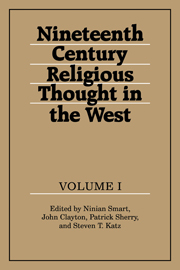7 - DAVID FRIEDRICH STRAUSS
Published online by Cambridge University Press: 05 August 2016
Summary
Faith and knowledge before Strauss
The opening of the nineteenth century's fourth decade in intellectual Germany was a time of extraordinary brilliance. One need only rehearse a few of the dazzling array of names that still graced the scene: Goethe, Hegel, Schleiermacher, Schelling. Friedrich Schlegel had only just died. The previous six decades had witnessed an astonishing explosion of literary and literary-critical, philosophical and theological talent, made all the more impressive for the interweaving of these three (and other) topics by the leading writers. But by now the classic statements of this brilliant period had been set down and the major systems frozen into place, so that the name tags so dear to intellectual historians were ready for application: there were Rationalist, Romantic and Idealistic systems. Within a few years the greatest writers (except Schelling) were dead. Not that there were no important new historical developments now. On the contrary; social, economic and political historians have found the subsequent era a fertile field. But in theology and philosophy the day of the epigones had come. (F. C. Baur in Tübingen is a partial exception to that generalization.)
But disciples need not be confined to small matters and they can show independence. Even if they lack originality and synthesizing ability they can raise powerful issues. And none did so with greater skill and impact than David Friedrich Strauss. Better than anyone in his day or for the most part since, he managed to clarify the issues posed by the previous generation's ways of relating theology and philosophy to each other and historical criticism of the Gospels to both.
- Type
- Chapter
- Information
- Nineteenth-Century Religious Thought in the West , pp. 215 - 260Publisher: Cambridge University PressPrint publication year: 1985
- 2
- Cited by



